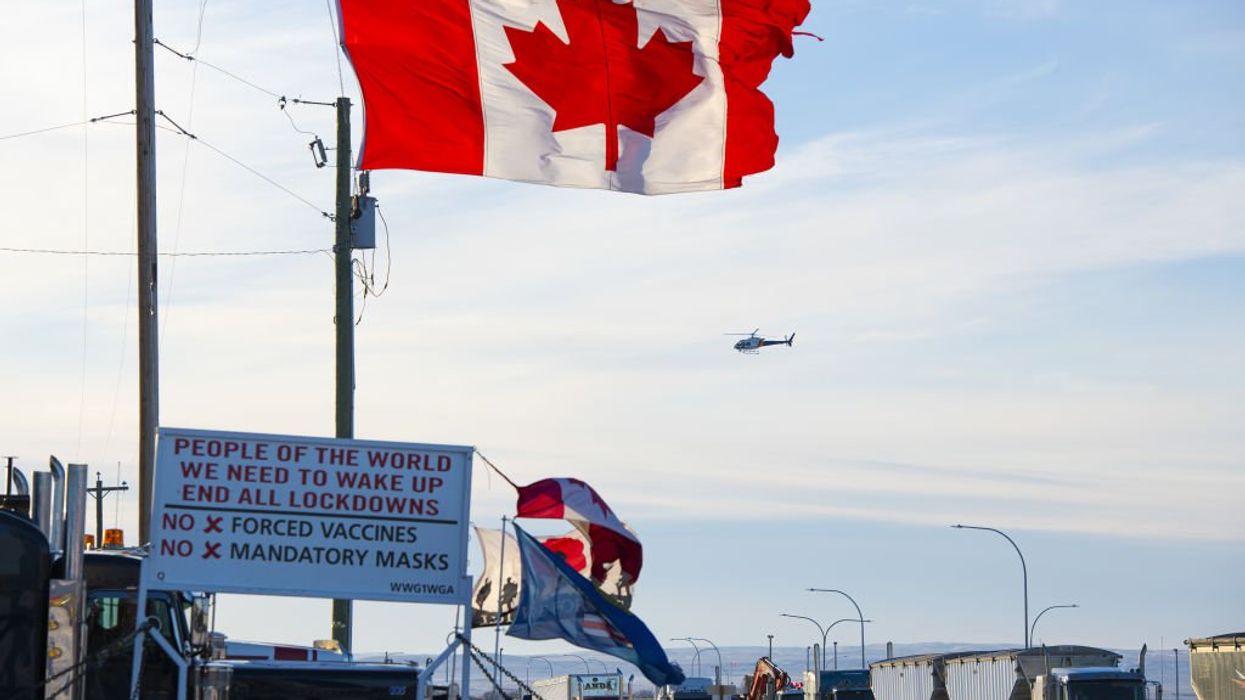© 2024 Blaze Media LLC. All rights reserved.
"Muslim Brothers mobilize for King Abdullah's overthrow."
Wednesday, U.S. Defense Secretary Leon Panetta announced that America was sending troops to Jordan. Why? The reasons offered by Sec. Panetta were tied to the latest escalation of the violence between the rebels and the Assad regime in Syria. Panetta was speaking at a NATO conference in Brussels and specifically referenced a few justifications for this action:
- The security of Syria's stock of chemical weapons.
- Rising numbers of refugees fleeing Syria and moving across the border into Jordan.
- To build a local headquarters for our troops in the region.
Panetta also said something that sparked a question about the possibility of other reasons behind the need to have American troops in Jordan:
"We have a group of our forces there working to help build a headquarters there and to insure that we make the relationship between the United States and Jordan a strong one so that we can deal with all the possible consequences of what's happening in Syria."
The phrase that caught our ear was -- "to insure that we make the relationship between the United States and Jordan a strong one ."
The need for a solid connection to Jordan may be better illustrated by looking at where the country sits in the region.
The map shows that Jordan's borders touch Egypt, Israel, Syria, Iraq, and Saudi Arabia. The location of Jordan could be viewed as strategically important to anyone hoping to have a hand in the stability of the region -- and especially if someone had an interest in surrounding Israel.
Jordan is not a country with the energy reserves like many of her neighbors (Saudi Arabia, Iraq, and Egypt). The US has been financially supporting Jordan for years. Last July it was reported that Washington promised $100 million in aid to assist Jordan with the flood of Syrian refugees. And this assistance is not new. Jordan has been averaging $450 million a year in US aid for quite some time.
Questions still remain:
- Why are we sending troops to Jordan?
- Why now? (the unrest has been raging for months)
- Is our money (estimated to be in the BILLIONS), not enough to stabilize the regime?
Could the answer be something different than the one being offered by Secretary Panetta? Several outlets are reporting that Jordan's government is now being pressured by the Muslim Brotherhood.
ABC News in Australia claims that the Muslim Brotherhood has pressured the King to dissolve the parliament. Jordan's nagging economic problems, worsened by the influx of refugees from Syria and the loss of needed gas supplies from Egypt have given power to the Muslim Brotherhood's populist pitch.
Qantara, a German news outlet, called Jordan "A Small Kingdom With Big Problems" in their September 29th story on the growing unrest. The report closed by stating:
Despite the king's far-reaching political powers, this popular support has strengthened the brotherhood's determination to gain political influence and achieve fundamental constitutional reforms. It now intends to boycott the parliamentary elections planned for the end of the year. Viewed in this light, it seems as if the Muslim Brotherhood is attempting to stage its own little "Jordanian Spring".
Russia Today (RT.com) has also pointed out the influence being brought to bear on Jordan's king from the Muslim Brotherhood. In an article titled, "Arab Monarchies: Muslim Brotherhood source of all problems in Islamic world" RT reports:
The Jordanian wing of the Brotherhood urged the country’s leadership to undertake reforms that would result in the monarchy losing political power. Abdullah II conceded, allowing changes to the procedure by which the country forms a government, with more privileges granted to the electoral winners. The Brotherhood criticized the move as insufficient, and called on their supporters to protest.
Debka.com has also been sounding the alarm on the alleged pressure on King Abdullah from the Muslim Brotherhood. Their latest post on the story called "Jordan a Kingdom 'on the brink'" and stressed "Muslim Brothers mobilize for King Abdullah's overthrow." Debka wondered which side America's leader was supporting in Jordan.
President Barack Obama has a balancing act to resolve: On the one hand, the Jordanian king has long been a staunch American ally and friend, its mainstay in many regional crises. On the other, Obama regards the Muslim Brotherhood as the linchpin of his external policy of outreach to the Muslim world.
Debka's pointing out of the balancing act lead me back to the State Department and our official stance on Jordan. The State Department website outlines the relationship here:
The United States deeply values its long history of cooperation and friendship with Jordan, with which it established diplomatic relations in 1949. The United States appreciates the special leadership role that Jordan plays in advancing peace and moderation in the region. The United States and Jordan share the mutual goals of a comprehensive, just, and lasting peace in the Middle East and an end to violent extremism that threatens the security of Jordan, the region, and the entire globe.
It would certainly be interesting to hear the White House answer which side of the Jordan tug-of-war America (and our military) is supporting.
Want to leave a tip?
We answer to you. Help keep our content free of advertisers and big tech censorship by leaving a tip today.
Want to join the conversation?
Already a subscriber?
more stories
Sign up for the Blaze newsletter
By signing up, you agree to our Privacy Policy and Terms of Use, and agree to receive content that may sometimes include advertisements. You may opt out at any time.
© 2024 Blaze Media LLC. All rights reserved.
Get the stories that matter most delivered directly to your inbox.
By signing up, you agree to our Privacy Policy and Terms of Use, and agree to receive content that may sometimes include advertisements. You may opt out at any time.



